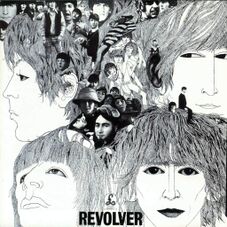Revolver
| This article is of a duplicate subject/concept as Revolter.
This article or section should be merged with the other article. If you are the author, consider merging the contents so we don't have to do it later.
|
|||
| Revolver | ||
|---|---|---|

| ||
| Album by The Beatles | ||
| Released | August 5, 1966 | |
| Recorded | May 18 - June 2, 1966 | |
| Genre | Psychedelia rock | |
| Length | 35:01 | |
| Record label | Parlophone | |
| Producers | Phil Spector | |
| Professional reviews | ||
| Oscar Wilde review | 5/5 - A triumph! Simply stunning! And that's just the cover art! | |
| The Rolling Stones review | 3/5 - Average, but slightly better than their previous work. Very hard to listen to without drugs, though. | |
| Jesus review | 0/5 - I'm still bigger than them! | |
Revolver may be The Beatles' seventh album, released on August 5, 1966. The album showcased a number of new stylistic developments which would become more pronounced on later albums, such as trippy drug references and more pronounced sexual metaphors. It was originally entitled Bigger than Jesus, but later changed since this fact is implicitely well known.
The most astonishing characteristic of this album was the methods used to produce its music. All songs, most prominently the psychodelic, acidic, anti-Catholic, suicidal, Eastern, controversial "Here, There and Everywhere" (whose hideous name had to be changed, as shown below), were created after one entire week's worth of experimenting with depressing drugs, hallucinogens, gold-colour paint spray, three-months-old bean burritos, insecticide, and pretty much everything else that is too disgusting to have inside one's place of residence.
The Biddles (this is the standard pronunciation of the band's name in non-First World countries) have given future musicians a great advice: get yourself stoned to near unconsciousness in order to create revolutionary, amazingly popular music.
"Elephant Rugby"[edit]
The song elephant rugby is noted for the lyrics "Elephant Rugby/pick up your teeth in the field...", which some might refer to as part of the theory that Paul is dead, referring to the fact that Paul's teeth were knocked out in the car crash onto a football field. There are also claims that the song "PAUL IS FUCKING DEAD" has a meaning to the urban legend, but most people don't hear it.
